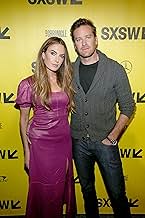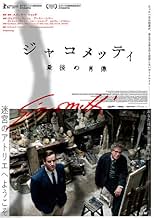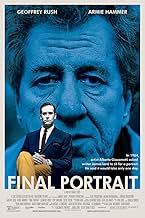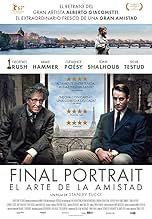IMDb RATING
6.3/10
6.3K
YOUR RATING
The story of Swiss painter and sculptor Alberto Giacometti.The story of Swiss painter and sculptor Alberto Giacometti.The story of Swiss painter and sculptor Alberto Giacometti.
- Awards
- 1 nomination total
Laura Bernardeschi
- Café Customer
- (uncredited)
Maja Bloom
- French Girl in the Dream
- (uncredited)
Marina Capasso
- Italian Friend of Giacometti
- (uncredited)
Laetitia Cazaux
- French Prostitute
- (uncredited)
Begoña Fernández Martín
- Graveyard Woman
- (uncredited)
Dolly Jagdeo
- Party Girl
- (uncredited)
- Director
- Writers
- All cast & crew
- Production, box office & more at IMDbPro
Featured reviews
Loved the film, it is definitely not for everyone, as an art student it was rather interesting to see an artists process of making a painting. The film itself is rather small, it is centred around one particular event. The acting is great. I would recommend it to artists and people who are interested in creative process of making an artwork.
Although in the '60's I knew famous artists could live in hovels, I never imagined the way Alberto Giacometti (Geoffrey Rush), the famous sculptor/painter, lived. In Final Portrait, his grimy Parisian first-floor apartment is strewn with famous spindly-limbed sculptures amid broken pottery and glass with an easel on which he paints a portrait of his friend, James Lord (Armie Hammer).
I am usually critical of stories about painters because these biopics rarely give insight into the artistic process (Girl with a Pearl Earring, Frida, and Pollock among my favorites, but disappointing that way), concentrating rather on the dynamic personal life. However, Final Portrait lets us sit with his subject and ingest the cranky chaos that has already bred world-wide fame.
While his wife Annette Arm (Sylvie Testud), is in attendance, the artist carries on at length with a delightful prostitute, Caroline (Clemence Poesy), goes to dives, disrespects money, chain smokes, and generally acts like the Bohemian he is.
Such seems the stereotype, but writer/director Stanley Tucci deftly adapts Lord's book, A Giacometti Portrait, to let us experience the disarray of the process that takes weeks. The artist is disappointed multiple times, starts over, yet really believes no portrait is ever finished.
Alberto Giacometti keeps us hoping that another day of Lord's sitting will produce a result, yet another day comes and goes into weeks. Lord, a writer, is remarkably patient as we all know genius will not be hurried. When it's over, however, you can bet on its being world-class.
Rush is charming as the disheveled genius, while Hammer is handsome, as always, and subdued in the artist's presence. I was not bored for a second because I felt like a visitor witnessing the workings of chaotic brilliance, a true friendship, and the essence of Parisian artistic life.
Sit back and enjoy an artist at work. It may seem slow, but it's not.
I am usually critical of stories about painters because these biopics rarely give insight into the artistic process (Girl with a Pearl Earring, Frida, and Pollock among my favorites, but disappointing that way), concentrating rather on the dynamic personal life. However, Final Portrait lets us sit with his subject and ingest the cranky chaos that has already bred world-wide fame.
While his wife Annette Arm (Sylvie Testud), is in attendance, the artist carries on at length with a delightful prostitute, Caroline (Clemence Poesy), goes to dives, disrespects money, chain smokes, and generally acts like the Bohemian he is.
Such seems the stereotype, but writer/director Stanley Tucci deftly adapts Lord's book, A Giacometti Portrait, to let us experience the disarray of the process that takes weeks. The artist is disappointed multiple times, starts over, yet really believes no portrait is ever finished.
Alberto Giacometti keeps us hoping that another day of Lord's sitting will produce a result, yet another day comes and goes into weeks. Lord, a writer, is remarkably patient as we all know genius will not be hurried. When it's over, however, you can bet on its being world-class.
Rush is charming as the disheveled genius, while Hammer is handsome, as always, and subdued in the artist's presence. I was not bored for a second because I felt like a visitor witnessing the workings of chaotic brilliance, a true friendship, and the essence of Parisian artistic life.
Sit back and enjoy an artist at work. It may seem slow, but it's not.
I understand that there are people that may have problems with this movie. It can be a frustrating movie to watch. But it can also be, funny, exasperating and sad. The acting is great. I don't place a judgement on the artist's behavior. He was as he was. This movie is about the artistic process, and the collaboration in that process. It can be tedious, chaotic and at times mesmerizing. It reminded me of a few of my friends who are artists. They truly do see the world in a different way, and at times you just have to go with it.
I wanted to see this movie because I like Geoffrey Rush and Tony Shalhoub. I'd never seen a movie directed by Stanley Tucci, either, so that interested me. I took myself to see this, and expected a semi-art house flick. This was... OK, in my opinion. Here's why:
The Good: The acting is good, which means the directing was good. Well acted and directed in my opinion.
The Bad: There's a bit more than the good, unfortunately. The scenes get a little repetitive after a while, there's a dark color tone to the film that takes a little while to get used to, and I don't feel like you really have a reason to care about the characters. You get left in the dark, just kind of wondering what's taking so long for this man to finish the portrait. He's all over the place. Sometimes studying his drawing, sometimes carousing his mistress, sometimes cursing up a storm. It's an odd situation, watching this film. I didn't dislike it, as some of the other patrons in my theater did, but I don't see a reason to revisit it. So... I'll give it 5/10.
The Good: The acting is good, which means the directing was good. Well acted and directed in my opinion.
The Bad: There's a bit more than the good, unfortunately. The scenes get a little repetitive after a while, there's a dark color tone to the film that takes a little while to get used to, and I don't feel like you really have a reason to care about the characters. You get left in the dark, just kind of wondering what's taking so long for this man to finish the portrait. He's all over the place. Sometimes studying his drawing, sometimes carousing his mistress, sometimes cursing up a storm. It's an odd situation, watching this film. I didn't dislike it, as some of the other patrons in my theater did, but I don't see a reason to revisit it. So... I'll give it 5/10.
The terrific character actor Stanley Tucci is also a terrific director, and for evidence of that look no further than his latest directorial effort, "The Final Portrait."
The film is fact-based, about sculptor and painter Alberto Giacometti (played by Geoffrey Rush), in 1964, toward the end of his career.
The plot revolves around Giacometti inviting author and arts aficionado James Lord (Arnie Hammer) to sit for one of his final portraits _ considered by many to be his last great picture _ at the Paris studio that Giocometti operates with his brother, Diego (Tony Shalhoub).
The result is a finely chiseled character study of the artist and an immensely fascinating depiction of the creative process.
Perfectly understated in every way, from performance to photography, the film is a gently, lilting valentine to all who share in the creative process, in any discipline.
False starts, self-doubt, depression, euphoria _ It's all there.
Rush believably and movingly captures a genius at the end of his days, right down to his shuffling gait and hunched carriage, without overdoing, while Shalhoub, a vastly under appreciated actor, makes every subtle expression and movement poignant and meaningful.
Hammer's young author Lord offers perfect counterpoint, posing questions with a look or gesture, serving as a wide-eyed link between the audience and the man he struggles to understand.
Sylvie Testud as the artist's wife, Annette, brings all the deep love and pain of a complicated relationship in each and every scene, while Clemence Poesy _ recently seen as the icy French detective in the TV series "The Tunnel" _ here shows a distant warmth and complexity as the prostitute who has become the artist's mistress.
The creative process is not a linear or always pretty one, but, as demonstrated here, it is invariably intriguing and can also inspire.
This 90-minute film comes highly recommended.
The film is fact-based, about sculptor and painter Alberto Giacometti (played by Geoffrey Rush), in 1964, toward the end of his career.
The plot revolves around Giacometti inviting author and arts aficionado James Lord (Arnie Hammer) to sit for one of his final portraits _ considered by many to be his last great picture _ at the Paris studio that Giocometti operates with his brother, Diego (Tony Shalhoub).
The result is a finely chiseled character study of the artist and an immensely fascinating depiction of the creative process.
Perfectly understated in every way, from performance to photography, the film is a gently, lilting valentine to all who share in the creative process, in any discipline.
False starts, self-doubt, depression, euphoria _ It's all there.
Rush believably and movingly captures a genius at the end of his days, right down to his shuffling gait and hunched carriage, without overdoing, while Shalhoub, a vastly under appreciated actor, makes every subtle expression and movement poignant and meaningful.
Hammer's young author Lord offers perfect counterpoint, posing questions with a look or gesture, serving as a wide-eyed link between the audience and the man he struggles to understand.
Sylvie Testud as the artist's wife, Annette, brings all the deep love and pain of a complicated relationship in each and every scene, while Clemence Poesy _ recently seen as the icy French detective in the TV series "The Tunnel" _ here shows a distant warmth and complexity as the prostitute who has become the artist's mistress.
The creative process is not a linear or always pretty one, but, as demonstrated here, it is invariably intriguing and can also inspire.
This 90-minute film comes highly recommended.
Did you know
- TriviaLondon doubled for Paris in the film because they couldn't afford to film in Paris. Filming took place over a week and a half and CGI was used to make it look like Paris. According to Tucci, it was cheaper for a small film to use CGI than to visit the real location.
- Quotes
[first lines]
James Lord: [narrating] In 1964, I was a young writer living in Paris. I had written a few articles about Alberto Giacometti, who was one of the most accomplished and respected artists of his generation. I had become good friends with Giacometti and his brother, Diego. And one day, after an exhibition, he asked me to sit for a portrait. He told me it would take no longer than two to three hours. An afternoon at the most.
- ConnectionsFeatured in Conan: Armie Hammer/Nick Swardson (2018)
- SoundtracksJazz à Gogo
Music by Alain Goraguer
Lyrics by Robert Gall
Published by Editions Bagatelle / EMI Music Publishing Ltd
Performed by France Gall
Courtesy of Polydor Records (France)
Under licence from Universal Music Operations Ltd
- How long is Final Portrait?Powered by Alexa
Details
- Release date
- Countries of origin
- Official sites
- Languages
- Also known as
- Фінальний портрет
- Filming locations
- Ruby's Bar & Lounge, 76 Stoke Newington Road, London, England, UK(old truck and french restaurant scene)
- Production companies
- See more company credits at IMDbPro
Box office
- Gross US & Canada
- $461,972
- Opening weekend US & Canada
- $25,472
- Mar 25, 2018
- Gross worldwide
- $1,677,835
- Runtime
- 1h 30m(90 min)
- Color
- Sound mix
- Aspect ratio
- 2.35 : 1
Contribute to this page
Suggest an edit or add missing content











































